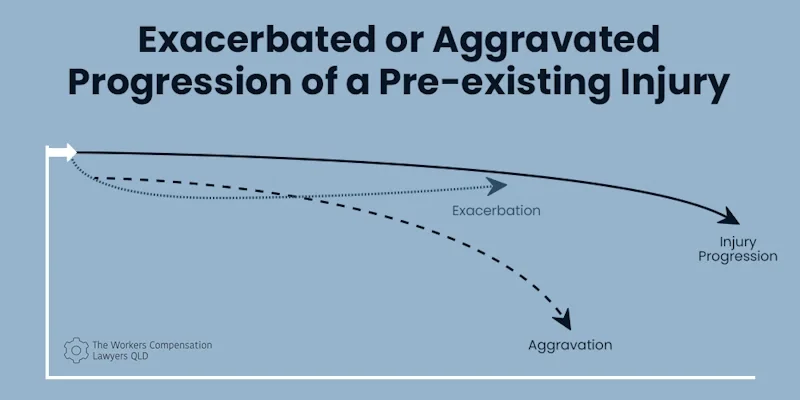When it comes to personal injury claims, one medical classification can mean the difference between receiving thousands or tens of thousands of dollars in compensation. If you get injured at work and it affects a pre-existing condition, your compensation entitlements will differ if it’s an aggravation versus an exacerbation. Hence, this classification is key to your financial recovery and future medical care.
The difference between aggravation and exacerbation can impact the amount of compensation and also your long-term access to medical treatment, disability benefits, and ongoing support. While both involve the worsening of pre-existing conditions, the legal and financial implications are very different.
Our legal guide explains the significant differences, including:
Check it out!
In Australia, an injured worker can still be eligible to receive workers’ compensation when an existing injury, illness, or mental health condition is temporarily or permanently worsened by their job. However, whether a work-related injury is exacerbated or aggravated can change the assessment of a workers’ comp claim.
Additionally, if you are familiar with the medical terminology for prior conditions, you will be better prepared for an injury claim.
When aggravation occurs, a previous injury becomes permanently altered, often requiring additional medical treatment and resulting in new or increased permanent disability.
This permanent worsening qualifies as a new injury under workers’ compensation legislation, triggering full coverage responsibilities for your employer’s insurance company, which is usually WorkCover.
In Australia, the medical community recognises that aggravation is a permanent injury, whereas exacerbation is a temporary increase in the symptoms of a preexisting medical condition.
Compared to aggravating an injury, an exacerbation of an injury refers to a temporary worsening of a pre-existing medical condition.
Workers’ compensation claims involving aggravated injury receive the same treatment as entirely new workplace injuries. This means you could be entitled to comprehensive benefits, including:
However, a new claim involving the worsening of an original injury is generally harder to prove because you must demonstrate that your job caused the aggravated injuries.
Here’s an example: A worker with pre-existing degenerative disc disease lifts a heavy object at work, causing a herniated disc that requires spinal fusion surgery.
When aggravation occurs due to your job, it can trigger comprehensive workers’ compensation benefits. In that case, your employer’s insurance might offer the following benefits:
Future medical care for the aggravated condition
In many cases, compensation extends beyond your immediate needs. If your aggravated injury requires ongoing physical therapy, prescription medications, or periodic medical evaluations, workers’ comp could cover these expenses indefinitely.
An exacerbated injury refers to a temporary worsening of existing medical conditions for a period, with the expectation that symptoms will eventually return to how they were before the incident.
Unlike aggravation, exacerbation doesn’t create permanent changes to your underlying pathology or result in lasting damage.
An exacerbation can seriously disrupt your daily life. You might have increased pain with reduced mobility and other worsened symptoms. However, the key distinction lies in the temporary nature of these changes. Thankfully, additional medical treatment can stabilise your condition and return it to its previous baseline in a reasonable timeframe.
An exacerbated, compensable injury can qualify for workers’ compensation benefits when they have active symptoms.
For example, a worker with pre-existing arthritis experiences a temporary flare-up after a workplace incident involving repetitive motions. The worker suffers severe pain and reduced mobility for six weeks but gradually improves with conservative treatment. After eight weeks, the arthritis symptoms return to their pre-incident level. This example represents exacerbation, not aggravation.
Independent medical evaluators can determine if an injury involves aggravation or exacerbation. These specialists conduct comprehensive examinations, review medical records, and apply AMA guidelines. Their professional opinion can directly impact whether or not an injured worker receives compensation.
Medical evaluators assess the following:
A successful WorkCover claim requires comprehensive medical evidence demonstrating the link between your workplace incident and the deterioration of your pre-existing condition. Necessary documentation includes:
The burden of proof involves providing clear medical evidence that your workplace incident caused permanent changes to your underlying condition, rather than just a temporary flare-up of existing symptoms.


Sometimes, an exacerbated pre-existing injury can transition to an aggravated one. However, this isn’t always immediately apparent.
In many jurisdictions, there is a three-month threshold that serves as a benchmark for assessment.
When courts dealt with lawsuits involving severe pain and degenerative diseases that keep getting worse, they set new standards for determining when exacerbation transitions to aggravation. These judicial decisions show that comprehensive medical data and expert testimony are needed to prove permanent worsening.
As you might expect, an aggravation versus exacerbation classification can create substantial differences in the value of workers’ comp payments. That’s why the proper classification of a work-related personal injury matters.
Generally speaking, aggravation results in permanent worsening, leading to higher compensation than exacerbation, which is temporary.
Experienced workers’ compensation lawyers understand the differences between aggravation and exacerbation, as well as the medical evidence standards required by work injury legislation. They can explain what it takes to ensure an accurate assessment of your case so you can access all your entitlements.
A legal team can explain the comprehensive evidence required to support an aggravation claim, including the following:
A personal injury lawyer can work with medical experts to establish clear causation between a workplace accident and the permanent worsening of your condition.
In Queensland, you have the right to seek legal advice to understand your circumstances for a new injury, or the permanent or temporary worsening of a previous injury.
The Workers Compensation Lawyers QLD offer a free case review that can explain where you stand.
All our personal injury legal services come with a genuine no-win, no-fee, no-risk guarantee. Pay only after a win, and zero if you lose. It’s free to start. Call 1800 575 023
Exacerbation and aggravation are not the same. Exacerbation occurs when a previous injury or illness worsens, while aggravated injuries are permanently worsened.
In medical terms, “Aggravated” describes a pre-existing condition that has been worsened by a new incident, such as a workplace accident or a motor vehicle crash. It indicates an event that caused their symptoms and led to a clear increase in the need for medical care.
A recurrence (in the context of personal injuries) denotes the reappearance of symptoms from a previous injury without the influence of any new external factors.
Conversely, an aggravation refers to the worsening of an existing condition caused by a new injury, which is often work-related.
A workers’ compensation claim that seeks financial remuneration for a work-related incident that worsens a pre-existing medical condition is often called an aggravation claim.